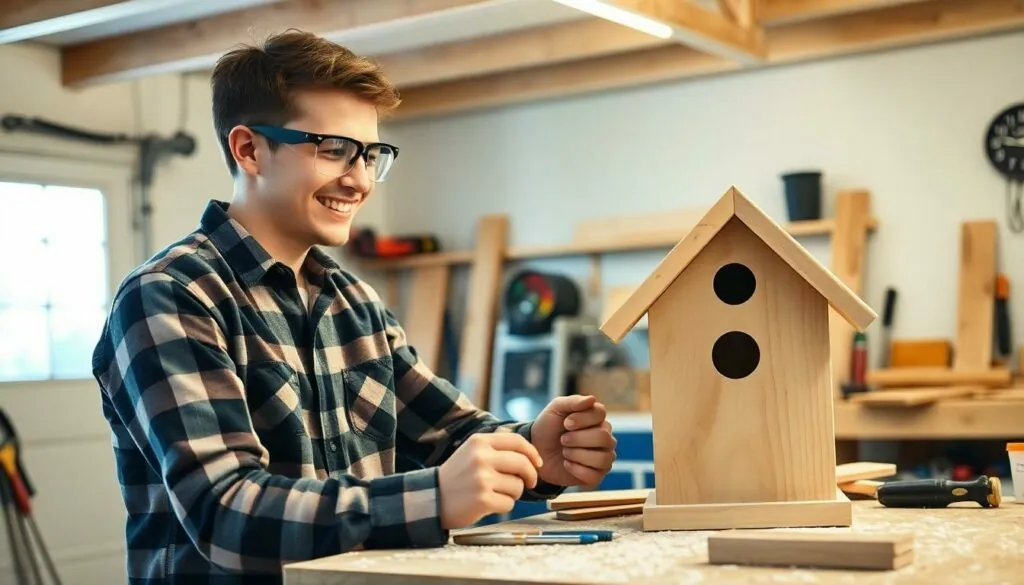Table of Contents
ToggleWeekends are the perfect time to unleash creativity and transform a few planks of wood into something spectacular. Whether it’s a rustic shelf or a quirky birdhouse, weekend wood projects not only add charm to a home but also provide a satisfying escape from the daily grind. Who wouldn’t want to swap Netflix for a little sawdust and a power drill?
Overview of Weekend Wood Projects
Weekend wood projects serve as an ideal way to combine creativity with practical skills. Engaging in these projects allows individuals to craft personalized items that enhance home aesthetics. Popular options include building rustic shelves, birdhouses, and garden benches. Each project offers a unique opportunity to explore woodworking techniques while producing functional pieces.
Time investment for such projects typically ranges from a few hours to a complete weekend, depending on complexity. Simple tasks, like assembling a planter, can take just a couple of hours. More intricate items, such as furniture, might require an entire weekend. Tools required for most projects include saws, drills, and sanders, ensuring that even novices can participate with some basic equipment.
Materials for weekend wood projects are readily available. Purchasing wood from local hardware stores or repurposing pallets can significantly reduce costs. Pint-sized cans of stain or paint can finish wood items, adding character and protection. Each step in the building process enhances skills in measuring, cutting, and joining pieces effectively.
Community engagement thrives through weekend wood projects. Workshops often host classes to guide new woodworkers and build connections with others in the craft. Sharing completed projects on social media encourages motivation and inspires creativity. Joining local woodworking groups can provide support and ideas for future undertakings.
Completing a wood project brings satisfaction, showcasing both effort and creativity. Many individuals find such activities rewarding as they create lasting items for their homes. Fostering a passion for woodworking not only transforms materials but also nurtures a fulfilling hobby that can be enjoyed for years.
Benefits of Weekend Wood Projects

Engaging in weekend wood projects offers numerous advantages. Participants often develop practical skills while enjoying creative fulfillment.
Skill Development
Through weekend wood projects, individuals enhance various skills essential for woodworking. Basic techniques like measuring, cutting, and assembling wood become second nature. Problem-solving skills grow as one navigates unexpected challenges during projects. Additionally, familiarity with tools increases, promoting confidence when using equipment. Each completed project serves as a tangible representation of improvements made, reinforcing learning outcomes. Whether crafting simple items or larger structures, skill development remains a key benefit.
Stress Relief
Woodworking serves as an effective stress relief activity. Immersing oneself in a creative project provides a break from daily pressures. Focus shifts from worries to the task at hand, resulting in mental clarity. The rhythmic motions of cutting and sanding offer a meditative experience, allowing individuals to unwind. Completing a project fosters a sense of accomplishment, boosting overall mood. Engaging in woodworking not only promotes relaxation but also cultivates mindfulness, making it an ideal weekend escape.
Popular Weekend Wood Projects
Weekend wood projects offer various options for woodworkers at every skill level. Engaging in these projects fosters creativity while producing functional items.
Beginner Projects
Simple wood projects cater to beginners eager to learn. Crafting a birdhouse requires minimal tools and basic measurements, making it an excellent starting point. Creating a picture frame can enhance artistic skills and provide personalization for home decor. Another easy project involves building a plant stand, ideal for showcasing indoor greenery. Using scrap wood from previous projects reduces material costs while promoting sustainability.
Intermediate Projects
Intermediate projects challenge woodworkers to enhance their skills. Constructing a garden bench combines design with practicality, enabling one to enjoy outdoor spaces comfortably. Building a storage box for tools offers functional organization while improving assembly techniques. Another intriguing option involves designing floating shelves that maximize wall space, perfect for display or storage. Completing these projects reinforces woodworking techniques and boosts confidence.
Advanced Projects
Advanced wood projects push creativity and skillsets to new heights. Crafting a dining table requires precision in measurements and cutting, ensuring a sturdy, stylish centerpiece. Designing a custom bookshelf not only showcases craftsmanship but also enhances overall home aesthetics. Another ambitious project could involve building a Adirondack chair, providing unique comfort for outdoor seating. Undertaking these challenging tasks allows individuals to showcase their expertise and create lasting family heirlooms.
Tools and Materials Needed
Engaging in weekend wood projects requires specific tools and materials for success. Understanding these essentials streamlines the crafting process and enhances the overall experience.
Essential Tools
Basic tools are indispensable for weekend wood projects. Saws, such as circular or jigsaw, facilitate cutting wood accurately. Drills and screwdrivers aid in assembling pieces securely. Clamps provide necessary support while glue or screws set. A measuring tape ensures precision in dimensions, and a square checks angles for accuracy. Sandpaper smooths surfaces, finishing touches that improve aesthetics. Safety goggles and ear protection are crucial to ensure a safe working environment.
Recommended Wood Types
Selecting appropriate wood types affects durability and appearance. Pine remains a popular choice, known for its affordability and ease of handling. Oak offers strength and a classic look, ideal for furniture pieces. Cedar is naturally resistant to decay, making it perfect for outdoor projects. Birch provides a smooth finish and can be stained for versatility. Plywood is practical for multiple applications, ensuring stability and cost-effectiveness. Choosing the right wood enhances both functionality and style in woodworking creations.
Tips for Successful Weekend Wood Projects
Planning effectively sets the foundation for any woodworking project. Begin by selecting a project that aligns with your skill level and interests. Create a list of required materials and tools to streamline the gathering process. Moreover, taking precise measurements minimizes mistakes and ensures an efficient workflow. Allocate time for completion based on the complexity of the project, and establish a realistic schedule. This approach keeps motivation high and prevents frustration.
Safety should always come first in woodworking. Wearing appropriate gear such as safety goggles and ear protection greatly reduces the risk of injury. Additionally, using tools according to manufacturers’ instructions promotes safe practices. Keep the workspace clean to avoid accidents, and ensure proper ventilation when working with chemicals, such as wood finishes. Lastly, knowing how to handle tools correctly contributes to both safety and project success.
Weekend wood projects offer a fulfilling way to express creativity and develop practical skills. Engaging in woodworking not only transforms simple materials into beautiful items but also provides a much-needed break from daily routines.
Whether it’s a beginner’s birdhouse or an advanced dining table, each project enhances skills and fosters a sense of accomplishment. The accessibility of tools and materials makes it easy for anyone to start.
Moreover, the community aspect of woodworking encourages connections and shared experiences. Embracing these projects can lead to lasting hobbies that enrich lives and homes alike. So why not pick up some tools and start crafting something unique this weekend?







